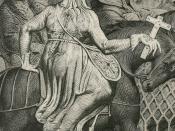The Pardoner and his TaleThe Pardoner's prologue and tale correspond with his character in a way that no other pilgrim does in The Canterbury Tales, by Geoffrey Chaucer. This correspondence can be seen through the Pardoner's insatiable greed. True irony can be found in the prologue, tale, and the Pardoner himself. The sermons, told by the Pardoner, possess an underlying purpose. The Pardoner's attempts to sell the fake relics only further manifest the Pardoner's true self. The typical tendencies of the Pardoner lead to a confrontation with the Host. The insecurities of the Pardoner indicate a possible flaw in his character. Ultimately, the Pardoner stays true to his prologue and tale.
The Pardoner possesses an insatiable hunger for money, and has thrown away his loyalty to God in order to fulfill that hunger. The Pardoner bases his tale around the moral that greed is the root of all evil.
He admits to his own greediness and how his avarice inspires him. The Pardoner says, "But let me briefly make my purpose plain; I preach for nothing but for greed of gain And use the same old text, as bold as brass, Radix malorum est cupiditas" (Chaucer 243). The Pardoner is somewhat proud of his greed and is not hesitant to admit it. Warren says, "the Pardoner declares himself a covetous man, and the only theme he preaches constitutes the chief condemnation of the vice in Scripture" (Ginsberg 69). The reason for the Pardoner's constant telling of this moral could possibly be that he knows it by heart.
The irony found in the Pardoner and his tale is uncanny. The very fact that the Pardoner preaches against greed yet profits from it, is irony in and of itself. The Pardoner says, "And thus I preach against the very...


